- Home
- Richard Lee Byers
Unclean: The Haunted Lands Page 12
Unclean: The Haunted Lands Read online
Page 12
“We have to surrender,” he said, “and hope we can escape later on. Set the knife on the ground.” He stooped to do the same with his sword, and then someone gave a startled yell.
Bareris looked around to see slaves scrambling in all directions. Evidently they shared Tammith’s conviction that some ghastly fate awaited them at the end of their trek, and they’d decided to take advantage of their keepers’ distraction to make a break for freedom.
“Stop them!” the necromancer with the flabby midsection—evidently his name was So-Kehur—wailed.
Some of the guards obeyed. Horsemen galloped and wheeled to cut the thralls off. A blood orc dashed after a group of fleeing men and started slashing them down from behind, evidently on the assumption that if it killed enough of them, the slaughter would cow the rest into giving up.
Of course, not every warrior turned his back on Tammith and Bareris, but as best the bard could judge, even those who hadn’t seemed momentarily flummoxed. So, for that matter, did the necromancers. Perhaps he had a hope left after all.
“Follow me!” he said to Tammith. He bellowed a battle cry and charged.
For an instant, he considered running at So-Kehur. Evidently worthless in a crisis, the round-bellied mage had yet to cast a spell and was surely an easier mark than the skull-faced warlock. He must possess an extraordinary aptitude for some aspect of sorcery, or else exceptionally good family connections, to account for his induction into an order of Red Wizards despite the lack of iron in his soul.
The problem was that even if they were of equivalent rank, it was plainly the necromancer with the tattooed face who’d taken charge of the caravan. Should they find themselves at odds, he was the one the warriors would obey, and just to make matters worse, he obviously held his fellow mage in contempt. Bareris could easily imagine himself grabbing So-Kehur, using him as a shield, threatening him with his sword, and having the tattooed wizard laugh and order his underlings to go ahead and shoot them both.
No, if Bareris was going to take a hostage, it had to be the skull-faced mage himself, and so he ran straight at him. He prayed Tammith was still following close behind him but didn’t dare waste the instant it would take to glance back and find out.
An arrow whistled past his head. An orc scrambled to block his path, and he split its skull. For a moment, his sword stuck in the wound, but then he managed to yank it free, flinging drops of blood through the air in the process.
Realizing his peril, the skull-faced necromancer brandished the talisman that had killed Bareris’s horse, a round medallion, the bard now observed, fashioned of ebony and bone. He wrenched himself to the side, and the jagged blaze of shadow missed him by a finger length.
He raced onward. Just a few more strides would carry him within striking distance of his foe, and with enchantment quickening his actions, he had reason for hope that his adversary didn’t have time to attempt any more magic.
But the necromancer had a trick in reserve. Even as his body backed away, his face seemed to spring forward like a striking snake. In reality, Bareris perceived, it was the tattooed skull mask that had torn free of his skin, and as it did, it rounded itself into a snarling head, and a gaunt, decaying body materialized beneath it. It had, in fact, become a ghoul, a slave creature or familiar the Red Wizard had carried inside his own body to evoke in a moment of ultimate need.
Startled by the vile-smelling thing’s unexpected materialization, Bareris faltered. The ghoul leaped, its jagged, filthy nails ripping at his face. They nearly snagged him, but then trained reflex twisted him out of the way. He hacked at the bumpy ridge of spine in the corpse eater’s withered back, and the undead’s legs buckled beneath it.
Bareris sprinted on. Looking unexpectedly soft-featured and callow with his macabre mask stripped away, the Red Wizard lifted his talisman for another blast. Bareris had believed he was already running his fastest, but somehow he achieved an extra iota of speed to close the distance. He cut at the necromancer’s hand, and the medallion and severed fingers tumbled through the air.
At that instant, Bareris hated the wizard, relished hurting him, and had to remind himself that he needed him alive. He shoved the necromancer down onto the grass, lifted his sword to threaten him—
A voice chanted rhyming words, and the ambient temperature fluctuated wildly. Bareris realized So-Kehur wasn’t entirely useless after all. He’d finally found the presence of mind to cast a spell.
Something stabbed into the middle of Bareris’s back. It didn’t hurt, precisely, but weakness streamed outward from the site like ink diffusing through water. His sword suddenly felt too heavy to support. The blade dropped, and the hilt nearly pulled itself from his grasp. He collapsed to his knees.
He told himself he didn’t need his stolen strength. He could hold a hostage down with his weight, and menace him with the lethal sharpness of his blade. He floundered after the necromancer with the maimed hand, but now the mage was the quicker and stayed beyond his reach.
Until a mesh of sticky cable abruptly materialized on top of Bareris, binding and gluing him to the ground. “I did it!” So-Kehur crowed. “I took him alive, just like you wanted.”
“So you did,” the other wizard gasped, rising unsteadily, “and now I’m going to kill the wretch.” Using his intact hand, he fumbled in one of his scarlet robe’s many pockets, no doubt seeking the talisman required to facilitate some sort of death magic.
Enfeebled as he was, it was difficult for Bareris even to turn his head. Still, praying she could help him somehow, he peered around for Tammith, only to see her slumped on the ground clutching at a bloody wound in her leg. An orc stood over her, spear aimed to stab her again if she attempted further resistance. Elsewhere, the creature’s fellow guards had all but completed the task of catching and subduing the rest of the slaves.
Bareris would have taken any risk to rescue or protect Tammith, but those things were no longer even remotely possible. He had to escape alone now in the hope of returning for her later, if, indeed, he could even manage that.
Rapidly as he dared—too much haste and he might botch the casting—he started singing. Weak as he was, he felt short of breath and had to struggle to achieve the precise intonation and cadence the magic required.
His would-be killer seemed clumsy with his off hand and was possibly on the verge of sinking into shock from the amputation of his fingers. He was slow producing his talisman, but when he realized Bareris was attempting magic, he managed to snatch it forth, flourish it, and jabber hissing, clacking syllables in some foul abyssal tongue.
A thing of tattered darkness, with a vague, twisted face and elongated fingers, swirled into existence between the necromancer and the prisoner caught beneath the sticky net. The wizard pointed, and the shadow pounced.
At the same instant, Bareris completed his spell-song. The world seemed to shatter into motes of light and remake itself an instant later.
The greatest spellcasters could work magic to whisk themselves and a band of comrades hundreds of miles in a heartbeat. Bareris had seen it done. He himself had no such abilities, or he would have employed them to carry Tammith to safety as soon as he clasped her in his arms, but he had mastered a song to translate a single person several yards in a random direction. A desperation ploy that could, with luck, save a man’s life after other measures failed.
Thus, he now sprawled on his belly a short distance away from his enemies and the slaves. As best he could judge, no one had spotted him yet, but somebody unquestionably would if he couldn’t conceal himself within the next few moments. He tried to crawl, and with the curse of weakness still afflicting him, the effort was so difficult it made him sob.
Crouching low, the shadow-thing started to pivot in his direction. Then something grabbed him by the sword belt and yanked him backward.
chapter six
26 Mirtul, the Year of Risen Elfkin
Mari Agneh rarely had much of an appetite, and this morning was no exception. She scraped the
eggs, fried bread, and peach slices off her dish into the chamber pot then performed what had come to be a ritual.
First, she slid the edge of the knife that had arrived with breakfast across her forearm. The blade appeared sharp but failed to slice her skin. In fact, the length of steel deformed with the pressure, as if forged of a material soft as wax.
Next she gripped the spoon. It too was made of metal and had an edge of sorts. A trained warrior, striking in fury and desperation, should be able to hurt someone with it, but when she thrust it at her outstretched limb, she felt only a painless prod, and the utensil bent double.
That left the pewter plate. She slammed it against her arm, and it didn’t even sting. It was like swiping herself with a sheet of parchment.
It was always thus. Every item that entered her prison immediately fell under the same enchantment, a charm that made it impossible for her to use it to hurt anyone, herself included. Strips of bed sheet and portions of the skimpy whorish costumes that were all she was given to wear unraveled as soon as she twisted them around her neck and pulled. Even the walls turned soft as eiderdown when she bashed her head against them.
She wondered how many more times she could perform her tests before accepting the obvious truth that her captor’s precautions would never ever fail, before abandoning hope.
What would happen to her then? Would she let go of the last shreds of her pride? Of sanity itself? The prospect was terrifying yet perversely tempting too, for if she broke or went mad, perhaps the torments would be easier to bear. Perhaps Aznar Thrul would even grow bored with her. Maybe he’d kill her or simply forget about her.
She struggled to quash the weak, craven urge to yield and be done with it, then noticed the vapor seething through the crack beneath the door.
Mari’s first thought was that some malevolent god had seen fit to grant the prayer implicit in her moment of despair, that Thrul, or one of his servants, was blowing a poisonous mist into the room to murder her. She didn’t actually believe it. The zulkir hadn’t shown any sign of growing tired of his toy, and she was certain that if he ever did decide to dispose of her, he’d at least want to watch her die. No, this was something else, which didn’t make it any less alarming.
The vapor swirled together and congealed into a towering creature with purple-black hide, four arms, a vaguely lupine countenance, and a brand on its brow. Mari retreated and picked up a chair. Like every other article in her prison, the seat would fall to useless pieces if she tried to strike a blow with it, but perhaps the demon, if that was what the thing was, didn’t know that.
Of course, it was ludicrous to imagine that such a horror might fear a nearly naked woman brandishing a chair in any case, but it was all she could think of to do.
The demon either smiled or snarled at her. The shape of its jaws was sufficiently unlike the structure of a human mouth that she couldn’t tell which.
“Greetings, Tharchion,” it rumbled. “My name is Tsagoth, and I’ve been hunting you for a while.”
“I don’t believe Aznar Thrul sent you,” she said, struggling to keep her voice steady. “If he wanted you to molest me, he’d also want to be here when you did it. If I were you, I’d think twice about bothering me without his consent.”
Tsagoth snorted. “You’re right. I am here without the zulkir’s permission, so scream for help if you think anyone will come. Let’s get that out of the way.”
It—or rather, he, for the hulking creature was plainly male—was right. She could try calling for help, but she wouldn’t.
“No. No matter how bad it gets, I never beg the swine for anything.”
Tsagoth’s hideous grin stretched wider. “I like that.”
His attitude didn’t actually seem threatening. Rather, it was … well, something else, something anomalous.
Still wary, but increasingly puzzled as well, she asked, “You like what?”
“Your toughness. I know something of what you’ve endured, and I expected to find you ruined, but you’re not. That will make our task easier.”
“What task?”
“Killing Thrul, of course. Attaining your revenge.”
She shook her head. “You don’t look like you need help to kill anybody you take a mind to kill.”
“You flatter me, Tharchion. I’m more than a match for most prey, but I’m not capable of destroying one of the most powerful wizards of your world. Nor, perhaps, is anyone, so long as he’s on his guard and armored with his talismans, enchanted robes, and whatnot. But what about those occasions when he lays aside his staff, divests himself of his garments, and is enframed and heedless with passion? Don’t you think he might be vulnerable then?”
“You mean, you want to hide here and attack while he’s … busy with me?”
“No, we can’t do it that way, not when we don’t know how many days or tendays it will be before he next visits you. I’m supposedly a slave here in the palace. If I go missing, people will search for me, and even if they didn’t, I imagine Thrul would sense a third party—a denizen of the Abyss, no less—lurking in your chamber. You’ll have to be the one to kill him, and though I know little of humans, I suspect you’ll prefer it that way.”
“I would if it would work,” Mari said, “but I don’t see how it can. His magic prevents any object that enters the room from serving me as a weapon and limits me in other ways as well. If he gives me a direct order, I have no choice but to follow it.” No matter how degrading. She felt nauseated at the memory of the laughter of the sycophants he’d brought to watch her perform.
“You won’t need a weapon if you are the weapon,” Tsagoth said, “and your puppet strings will break if you cease to be the sort of creature they were fashioned to control.”
“You want to … change me?”
“Yes.” Evidently the mark on his forehead itched, for he scratched at it with the claws on his upper left hand. “I’m a blood fiend. An undead. As vampires prey on humans, so does my kind prey on demons, and like vampires, we can, when we see fit, share our gifts and essential nature with others.”
“But you normally transform other creatures from the netherworld, don’t you?”
“Yes,” Tsagoth said, “and to be honest, I don’t know if it will work the same on you. You mortals are fragile vessels to contain the power I hope to give you. I can only tell you that he who summoned me cast spells to increase the likelihood of our success.”
“Who are you talking about?”
“I’m forbidden to say. Someone who wants to help you avenge yourself. Does anything else truly matter?”
Mari frowned. “It may. I’m willing to risk my life. As a warrior, I did it more times than I can remember, but if I change into something like you, will I still be the same person inside? Will I keep my soul?”
The blood fiend shrugged. The gesture looked peculiar with four arms performing it. “I can’t say. I’m a hunter, not a scholar of such esoterica, but ask yourself if this spark you mortals prize so highly is truly of any use to you. Does it make your punishments and humiliations any less excruciating? If not, what good is it compared to a chance for retribution?”
Maybe he was right, and even if not, it abruptly came to her that in all probability, he was going to transform her whether she consented or not. Ultimately, he was as much a slave as she was and had no choice but to carry out his master’s commands. He was offering her the opportunity to agree because … she wasn’t sure why. It seemed preposterous to imagine that such a being could like her or consider her a kindred spirit, but perhaps her initial defiance had elicited a measure of respect.
If so, she was glad to have it. It had been a long while since anyone, even the servant who brought her meals, had shown her anything but contempt. She didn’t want to forfeit that regard by showing fear, by obliging him to treat her as victim and pawn instead of accomplice, and perhaps that was what ultimately tipped the balance in her mind.
“Yes,” she said. “Make me strong again.”
&nbs
p; Tsagoth grinned. “You were never truly strong, human, but you will be.” He clawed a gash into the palm of his lower left hand and held it out to her. “Drink.”
His blood was like fire in her mouth, but she forced herself to suck and lap it anyway.
Bareris wasn’t sure if he was a guest or a prisoner of the gnolls, and at first he was nearly too sick to care. So-Kehur’s curse of weakness was to blame. Ordinarily such afflictions passed quickly, but the effects of arcane magic, partaking as it did of primordial chaos, were never entirely predictable, and maybe some lingering vestige of the illness from which Bareris had only recently recovered rendered him particularly susceptible. In any event, it had taken him well into the next day to start feeling any stronger at all.
Thus, when, guards shouting and cracking their whips, the caravan resumed its trek, he’d had no choice but to simply lie and watch, not that he could have prevented it in any case. Lie and watch as Tammith’s captors marched her away into the gathering darkness.
Once the procession vanished, the gnoll who’d dragged him back into the low place in the earth, thus hiding him from the Red Wizards and their minions, rose, hoisted him onto its back, and headed north. A head taller than even a lanky Mulan, the creature with its hyenalike head, coarse mane, and rank-smelling spotted fur manifestly possessed remarkable strength and stamina, for its long stride ate up the miles without flagging, until it reached the rude camp—three lean-tos and a shallow pit for a fire—it had established with several others of its kind.
Evidently they were all out hunting and foraging, for as the night wore on, they returned one or two at a time with rabbit, edible roots, and the like, which they grilled all together in an iron skillet. Bareris’s rescuer—or was it captor?—insisted that he receive a share of the meal, and while some of its comrades snarled and bared their fangs, none was as big or powerful-looking, and their display of displeasure stopped short of actual resistance.

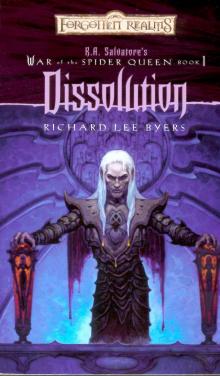 Dissolution
Dissolution Arkham Horror- Ire of the Void
Arkham Horror- Ire of the Void The Haunted Lands: Book II - Undead
The Haunted Lands: Book II - Undead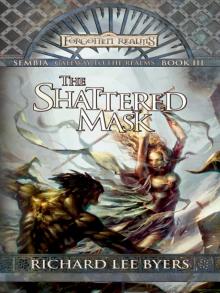 The Shattered Mask
The Shattered Mask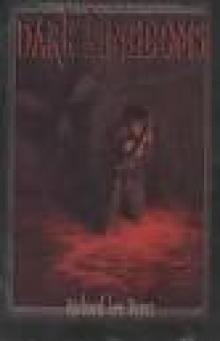 Dark Kingdoms
Dark Kingdoms The Masked Witches: Brotherhood of the Griffon, Book IV
The Masked Witches: Brotherhood of the Griffon, Book IV The Plague Knight and Other Stories
The Plague Knight and Other Stories Unclean: The Haunted Lands
Unclean: The Haunted Lands The Captive Flame: Brotherhood of the Griffon • Book 1
The Captive Flame: Brotherhood of the Griffon • Book 1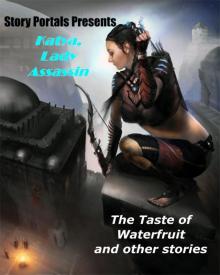 The Taste of Waterfruit and Other Stories (Story Portals)
The Taste of Waterfruit and Other Stories (Story Portals) The masked witches botg-4
The masked witches botg-4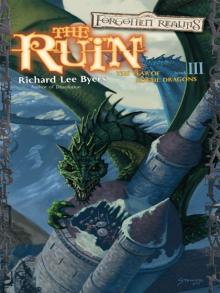 The Ruin
The Ruin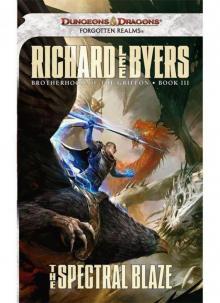 The Spectral Blaze botg-3
The Spectral Blaze botg-3 The Masked Witches
The Masked Witches Blind God's bluff bf-1
Blind God's bluff bf-1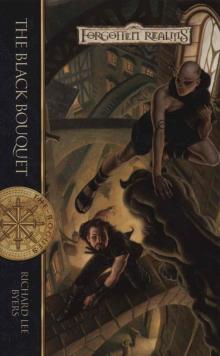 The Black Bouquet r-2
The Black Bouquet r-2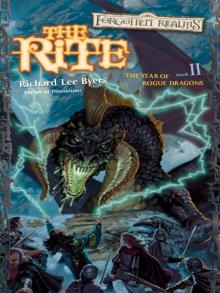 The Rite
The Rite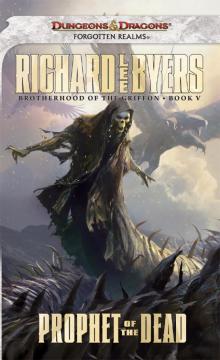 Prophet of the Dead: Forgotten Realms
Prophet of the Dead: Forgotten Realms The Shattered Mask s-3
The Shattered Mask s-3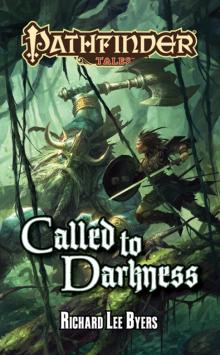 Called to Darkness
Called to Darkness Undead hl-2
Undead hl-2 Blind God's Bluff: A Billy Fox Novel
Blind God's Bluff: A Billy Fox Novel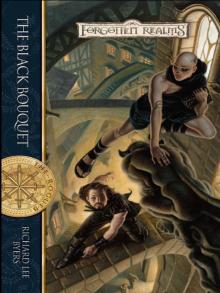 The Black Bouquet
The Black Bouquet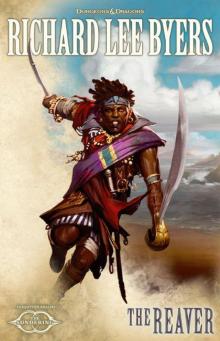 The Reaver
The Reaver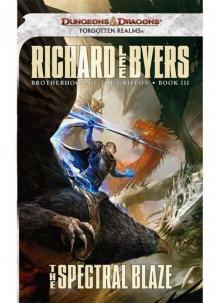 The Spectral Blaze: A Forgotten Realms Novel
The Spectral Blaze: A Forgotten Realms Novel Queen of the Depths
Queen of the Depths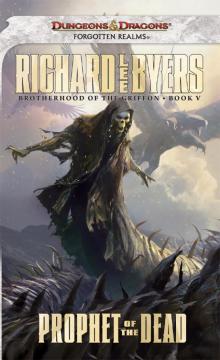 Prophet of the Dead botg-5
Prophet of the Dead botg-5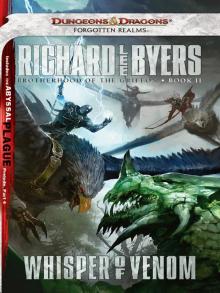 Whisper of Venom: Brotherhood of the Griffon, Book II
Whisper of Venom: Brotherhood of the Griffon, Book II The Captive Flame botg-1
The Captive Flame botg-1 The Haunted Lands: Book III - Unholy
The Haunted Lands: Book III - Unholy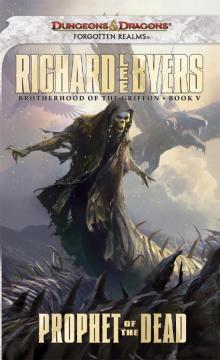 Prophet of the Dead
Prophet of the Dead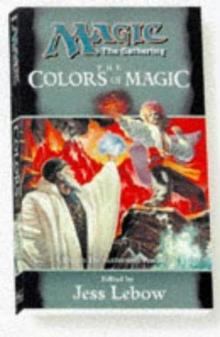 The Colors of Magic Anthology (magic: the gathering)
The Colors of Magic Anthology (magic: the gathering) Unholy hl-3
Unholy hl-3 Unclean hl-1
Unclean hl-1 Blind God's Bluff
Blind God's Bluff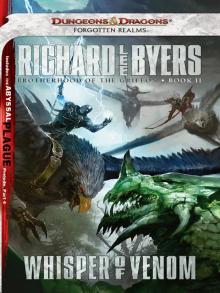 Whisper of Venom botg-2
Whisper of Venom botg-2 The Spectral Blaze
The Spectral Blaze